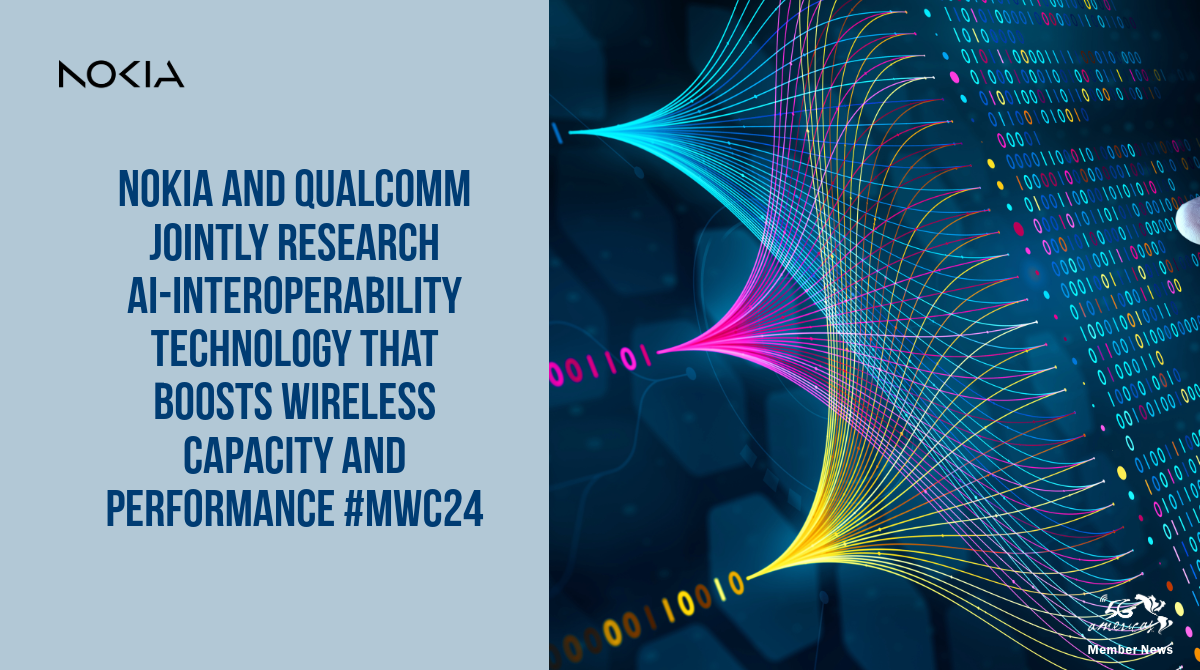
Nokia Media Release | 20 Feb 2024
Press Release
Nokia and Qualcomm jointly research AI-interoperability technology that boosts wireless capacity and performance #MWC24
- Qualcomm and Nokia Bell Labs have overcome an important challenge of AI interoperability that prevents cooperation between multi-vendor artificial intelligence (AI) systems in devices and networks.
- Utilizing a technique called sequential learning, different AI models can be independently trained, allowing them to coordinate with each another without the need to share AI models that are a differentiator for vendors.
- Qualcomm and Nokia Bell Labs have produced a prototype of this sequential training solution and will demonstrate it at MWC24 in Barcelona.
Espoo, Finland and San Diego, CA – Qualcomm Technologies and Nokia today announced that they developed a prototype technology that could solve the problem of interoperability, one of the fundamental challenges facing AI’s use in wireless systems. By enabling multi-vendor interoperability between the different AI models used in networks and devices, future wireless systems would support the use of AI to achieve greater capacities and better performance while potentially reducing their energy consumption.
Qualcomm Technologies and Nokia Bell Labs have implemented this technology into an AI proof-of-concept using a Nokia Bell Labs test network and a Snapdragon 5G modem-RF system. The two companies will be demonstrating this proof-of-concept at Mobile World Congress 2024 in Barcelona.
AI and machine learning will have significant impact on wireless communications in the future as AI models can optimize a radio’s performance to its specific surroundings. But for AI to reach its full potential in the radio network, different AI systems utilized by networks and devices need to coordinate their activities. Otherwise, these AI systems could work at cross purposes.
Qualcomm Technologies and Nokia Bell Labs have taken a new approach to AI interoperability that utilizes a technique called sequential learning. Using sequential learning, the network and device share data about the connection relevant for AI training, but do not have to share the actual AI model. Then independent encoders and decoders use that data to train the network AI and device AI separately. These independent encoders and decoders effectively act as translators, allowing multiple vastly different AI systems to share their knowledge with one another. Through sequential training, these various AI models would reinforce one another, regardless of vendor. Additionally, sequential training can also enable wireless handset or devices from multiple vendors, each with their own encoder implementation, to interwork with the same base station with its common decoder in the network. This saves time in training and helps scalability for future real-world deployments.
Tingfang Ji, VP of Engineering at Qualcomm Technologies, said: “AI has revolutionized many aspects of our life and society, and Qualcomm is leading the edge AI technology. For AI to bring new capabilities, efficiency and performance to multi-vendor wireless systems, the ecosystem needs to work together to enable wireless AI on the global scale. Collaborating with Nokia on AI interoperability is an encouraging first step toward defining a scalable global standard.”
Peter Vetter, President of Bell Labs Core Research, Nokia, said: “The potential for AI is substantial in communications. A data-driven air interface can learn about its environment to improve its performance and efficiency. We are already seeing AI implemented in 5G and 5G-Advanced, however, it will achieve its fullest potential in the 6G era.”
Resources and additional information
Blog: Scaling up AI/ML for cellular radio access
Blog: AI/ML enhanced mobility in 5G-Advanced paving the way for an AI-native 6G
Video: 6G AI native air interface proof of concept
A demonstration of this proof-of-concept will be on display at Mobile World Congress 2024 in Qualcomm’s booth at Hall 3 Stand 3E10 and Nokia’s booth at Hall 3 Stand 3A20
About Nokia
At Nokia, we create technology that helps the world act together.
As a B2B technology innovation leader, we are pioneering networks that sense, think and act by leveraging our work across mobile, fixed and cloud networks. In addition, we create value with intellectual property and long-term research, led by the award-winning Nokia Bell Labs.
Service providers, enterprises and partners worldwide trust Nokia to deliver secure, reliable and sustainable networks today – and work with us to create the digital services and applications of the future.
Media inquiries
Nokia Communications, Corporate
Email: [email protected]
Follow us on social media
LinkedIn X Instagram Facebook YouTube
